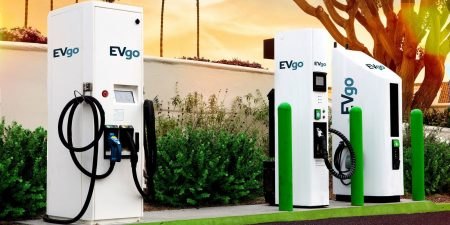Welcome to Electric Avenue — More Chargers on the Way
The Electric Highway Coalition, a consortium of six utility companies, will provide a network of 20-30 minute DC fast chargers for EV drivers, as reported by Electrek. Each of the utilities will be responsible for providing EV charging within their service areas, with most sites located along major highways for easy access and adjacency to other amenities.
Their mandate is to ensure drivers of EV have accessible charging stations along the Atlantic coast as far north as Washington, D.C., throughout the South, into the Gulf states, and the Central Plains. The power companies involved are: American Electric Power in Ohio, West Virginia, Texas and Oklahoma; Entergy Corporation in Arkansas and Louisiana; Tennessee Valley Authority in Mississippi and Tennessee; Southern Company in Alabama and Georgia; Duke Energy in Indiana, Florida, North and South Carolina; and Dominion Energy in Virginia and parts of South Carolina.
Jeff Lyash, Tennessee Valley Authority (TVA) president and CEO said, “Together, we can power the electric road trip of tomorrow by ensuring seamless travel across a large region of the U.S. This is one of many strategic partnerships that TVA is building to increase the number of electric vehicles to well over 200,000 in the Tennessee Valley by 2028. EV adoption will spur jobs and economic investment in the region, keep refueling dollars in the local economy, reduce the region’s largest source of carbon emissions, and save drivers and businesses money.”
Jointly, the Tennessee Department of Environment and Conservation and the TVA announced the development of a statewide network of EV fast charging stations every 50 miles along the interstates and major highways.
The most interesting part of this announcement came from the American Public Power Association, a service organization representing 2,000 community-owned utilities, who reported last year that there would be 10 to 35 million EVs in the U.S. by 2030, up from 1.5 million EVs in the U.S. in 2020, anywhere from a 6.66- to 23.33- percent increase in the number of EVs. They also noted that it would an investment of $75-$125 billion would be needed to revamp the electric power system by that date to service an estimated 20 million EVs. That’s somewhere between $3,750-$6,250 per EV. At that rate, maybe the astronomical rate being charged by the utility companies in Texas recently is their way of financing EV expansion?
[Images: Electric Highway Coalition, TVA]
With a father who owned a dealership, I literally grew up in the business. After college, I worked for GM, Nissan and Mazda, writing articles for automotive enthusiast magazines as a side gig. I discovered you could make a living selling ad space at Four Wheeler magazine, before I moved on to selling TV for the National Hot Rod Association. After that, I started Roadhouse, a marketing, advertising and PR firm dedicated to the automotive, outdoor/apparel, and entertainment industries. Through the years, I continued writing, shooting, and editing. It keep things interesting.
More by Jason R. Sakurai
Latest Car Reviews
Read moreLatest Product Reviews
Read moreRecent Comments
- ToolGuy TG likes price reductions.
- ToolGuy I could go for a Mustang with a Subaru powertrain. (Maybe some additional ground clearance.)
- ToolGuy Does Tim Healey care about TTAC? 😉
- ToolGuy I am slashing my food budget by 1%.
- ToolGuy TG grows skeptical about his government protecting him from bad decisions.



































Comments
Join the conversation
I just hope that there will be enough charging ports at various stations if EVs proliferate. It's one thing to wait in line for a guy in front of you to fill his gas tank, but waiting in line behind multiple EVs would take much longer.
How US was able to build Interstate highway system which is considered as a one of the wonders of the world and put man on the moon and same time not capable of building a single high speed rail? Or set up reliable energy system similar to Russian Unified Energy System. I predict daily blackouts and people freezing to death in US if government goes forward with making ICE cars illegal.